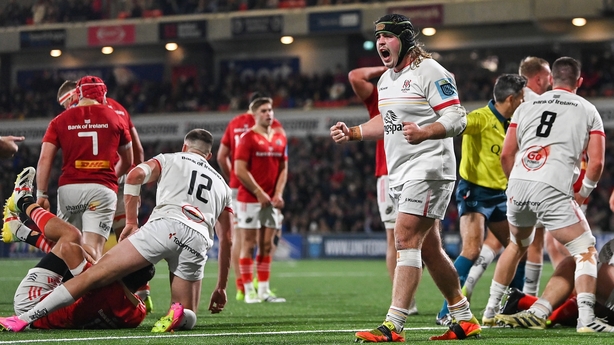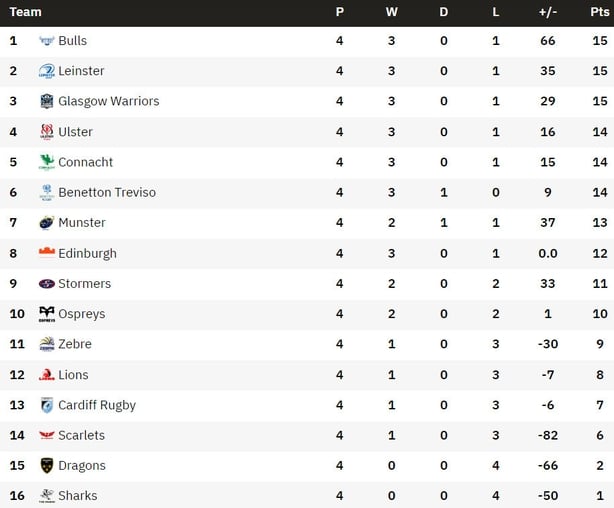After a disappointing defeat against Connacht, Ulster exacted their interprovincial revenge on Munster in Belfast on Friday night.
The game itself was a bit of a stalemate at the breakdown. Both sides struggled to get meaningfully quick ball which meant that the attacking structures throughout weren't altogether exciting.
There were moments where we saw the shape of both teams. All of the Irish provinces are playing with similar structures to the national side during the World Cup, so there were sweep passes and backs swinging around to create overloads. However, the ball was never consistently quick enough to cause major damage.
It was Jack Crowley’s kicking game that got Munster into the game, gaining territory from Stockdale’s dropped ball. Munster used their scrum to get a foothold in the game, something that would later go against them.
After three scrum penalties and another penalty advantage in the scrum, Craig Casey dummied and danced his way towards the first of his two tries in the opening quarter.
Ulster pulled a try and penalty back, again using their attacking kicks from Stewart Moore and Billy Burns for Stockdale to score in the left corner.
Alex Nankivell showed his strength in Munster’s midfield. In similar fashion to World Cup winner and ex-Munster centre Damien de Allende, Nakivell won a number of penalties through his poaching ability and strength in the breakdown.
Ulster certainly targeted the Munster breakdown, Stuart McCloskey and Dave McCann were the most disruptive to the flowing attack of Casey and Crowley on Munster’s side. The breakdown is becoming increasingly difficult to interpret, and there could be arguments for some illegal actions at the breakdown for both sides.
The ruck has become the winning and losing of the game and is a huge focal point through opposition analysis. We saw a lot of focus on the breakdown speed in the build-up to the World Cup, with the emphasis being put on Ireland’s speed of ball.
Similar to how South Africa and New Zealand disrupted the Irish attack, Ulster got to grips with Munster’s fast start and stemmed their flow by assaulting their breakdown. The ball became slower and Munster became less effective in possession.
The Ulster bench had a huge impact on the game. Introducing internationals such as Iain Henderson and the record-breaking Rob Herring, as well as debutant Scott Wilson, turned the game in Ulster’s favour.

McCann played a starring role from start to finish, he turned over two Munster lineouts after the introduction of Scott Buckley, which affected Munster’s return in attack. In fact, Munster didn’t score after the opening quarter, showing how stale the game went for them.
Ulster levelled the game after a trio of penalty concessions. Two for Munster second rows not rolling away and a poor decision at the ruck from Stephen Archer. They were followed by a match-winning scrum that allowed Nick Timoney to fall over the line.
It shows that despite the intricate attacking plays that we saw throughout the World Cup, the basics and foundations of the game are still where the game is won and lost.
The Munster breakdown was attacked by Ulster, and they gave away six points for illegally hindering Ulster’s breakdown and speed of ball.
The Munster lineout was picked off by McCann and co. in the second half which meant that Munster were limited to unstructured attack in a game that was far from unstructured. It was slow and lacking opportunities because of the ruck speed.
The scrum trouble was the nail in Munster’s coffin, conceding a penalty at the end of the third quarter and the match-winning score from the set piece 10 minutes later.
The scrum that gave Munster their entry into the game, taking the lead in a tough away venue, also put them behind with just 10 minutes to play.
Munster had opportunities after that to get themselves back in the game. They created a line break through Rory Scannell after an offload from Gavin Coombes. Munster also won penalties in the breakdown due to McCloskey and McCann going too far in trying to disrupt the Munster platform.
It wasn’t enough in the end, Josh Wycherley was held up over the line when Munster would have backed themselves to come away from their dominant 22-metre attack with a score.
It was a fitting end for Ulster. Herring turned the ball over on the night when he became the most capped Ulster player. The seven-point win put them back in the top four.
Munster fell to their first loss in the opening four games of the season. Playing away from home against Ulster never guarantees a result, but it was the manner in which they lost that will disappoint them.

They’ll go back to the drawing board to address their issues in the lineout, the scrum and put the microscope on their attacking breakdown to ensure that they don’t let the same thing happen when they take on the Stormers in Thomond Park on Saturday night.
Returning internationals will help to strengthen the foundations of their game. Tadhg Beirne, Jean Kleyn and Peter O’ Mahony will be particularly important for the set piece and the breakdown. With Europe fast approaching, it’s time for the Irish provinces to get back to full strength so they can compete at the top level once again.
Munster will need a win at home to climb away from the middle of the URC table and back towards the top where they believe they belong.
Watch Sharks v Connacht in the URC on Saturday from 2.30pm on RTÉ2 and RTÉ Player


